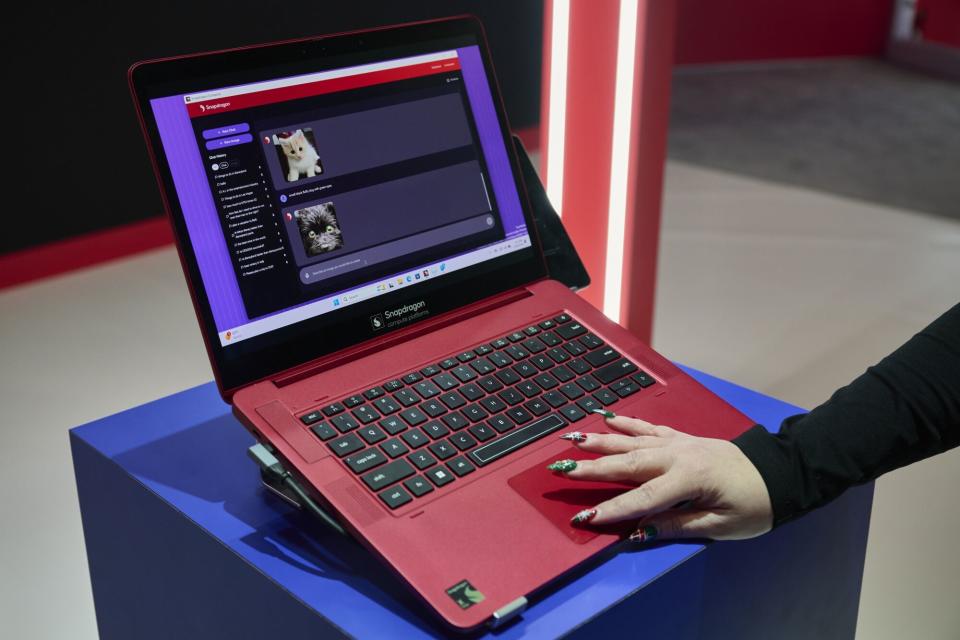Qualcomm Says Laptop Users Will Leave Power Bricks Behind

(Bloomberg) -- Qualcomm Inc. said owners of laptops built on its new chips will be able to use the computers as much as they want without having to worry about the battery dying.
Most Read from Bloomberg
S&P 500 Hits 25th Record This Year as Tech Soars: Markets Wrap
BlackRock, Citadel Back Texas Stock Exchange in Challenge to NYSE
Billionaire-Friendly Modi Is Punished by Millions of Poor Voters
Goldman Sees ‘Wall of Money’ Fueling Stock Market’s Summer Party
San Diego-based Qualcomm is providing the semiconductors underpinning Microsoft Corp.’s new breed of Copilot+ PCs that feature the software maker’s latest and best artificial intelligence enhancements. Both Microsoft and Qualcomm have said the chipmaker’s hardware is essential for making those AI additions possible — and to process them efficiently enough to keep a device running for a long time without a recharge.
“We’re really making history together and the industry is starting to take notice,” Chief Executive Officer Cristiano Amon said in Qualcomm’s keynote address at the Computex trade show on Monday. “I believe it’s as significant as Windows 95.”
Qualcomm and some of its peers have spent more than a decade trying to loosen the dependency of the PC industry on Intel Corp. and provide a fresh set of key components using the Arm Holdings Plc technology that’s dominant in the smartphone industry. Windows laptops based on Qualcomm’s Snapdragon X Elite systems will have as much as twice the battery life of traditional counterparts, Amon said. And when it comes to running some AI features, the power efficiency will be more than 100 times greater, he said.
Read More: Microsoft Debuts New AI Products as It Battles Apple, Google
The CEO’s bullishness about the new devices is part of his attempt to diversify Qualcomm’s sources of revenue — the company’s mobile chips are ubiquitous across the smartphone industry, but it trails rivals in other segments. The greater efficiency and connectivity offered by Qualcomm’s products will help it win share in a number of new markets, including automotive and computing, Amon has said.
Last month, Microsoft unveiled its Copilot+ computers infused with artificial intelligence features. The machines from Microsoft’s Surface line — all based on Qualcomm chips — and manufacturing partners will offer more power and will be faster than Apple Inc.’s top-of-the-line MacBook Air, Microsoft said. Lenovo Group Ltd., Dell Technologies Inc. and Asustek Computer Inc. are among the partners who’ve announced they’ll release Snapdragon-powered Copilot+ laptops.
“Qualcomm is now in this neighborhood to stay, we’re not going anywhere, and we’re very happy to be working with our partners,” Amon said, wearing a pair of white sneakers with the Copilot logo printed on them. Microsoft’s Windows chief Pavan Davuluri joined Amon on stage and the two men hugged to underscore the warmth of their business partnership. Davuluri had earlier in the day participated in the keynote address of Advanced Micro Devices Inc. alongside CEO Lisa Su, talking up the depth of that collaboration as well.
The AI-based push may add new momentum to an effort that so far has failed to make a dent in Intel’s dominance in PCs. Qualcomm will have to capture consumer attention and deliver compatibility with all of the software and peripherals that PC users rely on.
--With assistance from Jane Lanhee Lee.
Most Read from Bloomberg Businessweek
David Sacks Tried the 2024 Alternatives. Now He’s All-In on Trump
Startup Brings New Hope to the Pursuit of Reviving Frozen Bodies
The Budget Geeks Who Helped Solve an American Economic Puzzle
©2024 Bloomberg L.P.

 Yahoo Finance
Yahoo Finance 